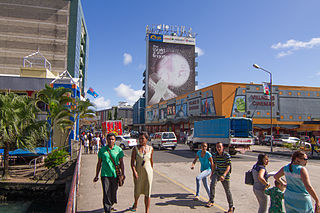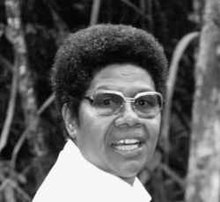
Fiji, officially the Republic of Fiji, is an island country in Melanesia, part of Oceania in the South Pacific Ocean. It lies about 1,100 nautical miles north-northeast of New Zealand. Fiji consists of an archipelago of more than 330 islands—of which about 110 are permanently inhabited—and more than 500 islets, amounting to a total land area of about 18,300 square kilometres (7,100 sq mi). The most outlying island group is Ono-i-Lau. About 87% of the total population live on the two major islands, Viti Levu and Vanua Levu. About three-quarters of Fijians live on Viti Levu's coasts, either in the capital city of Suva, or in smaller urban centres such as Nadi or Lautoka. The interior of Viti Levu is sparsely inhabited because of its terrain.

Suva is the capital and the most populous city of Fiji. It is the home of the country's largest metropolitan area and serves as its major port. The city is located on the southeast coast of the island of Viti Levu, in Rewa Province, Central Division.

Fiji is a group of volcanic islands in the South Pacific, lying about 4,450 kilometres (2,765 mi) southwest of Honolulu and 1,770 km (1,100 mi) north of New Zealand. Of the 332 islands and 522 smaller islets making up the archipelago, about 106 are permanently inhabited. The total land size is 18,272 km2 (7,055 sq mi). It has the 26th largest Exclusive Economic Zone of 1,282,978 km2 (495,361 sq mi).

Nadi is the third-largest conurbation in Fiji. It is located on the western side of the main island of Viti Levu, and had a population of 42,284 at the most recent census, in 2007. A 2012 estimate showed that the population had grown to over 50,000. Nadi is multiracial with many of its inhabitants Asians, Indian or Indigenous Fijians, along with a large transient population of foreign tourists. Along with sugar cane production, tourism is a mainstay of the local economy.

Vanua Levu, formerly known as Sandalwood Island, is the second largest island of Fiji. Located 64 kilometres to the north of the larger Viti Levu, the island has an area of 5,587.1 square kilometres (2,157.2 sq mi) and a population of 135,961 as of 2007.

Lautoka is the third largest metropolitan area in Fiji. It is on the west coast of the island of Viti Levu, in the Ba Province of the Western Division. Lying in the heart of Fiji's sugar cane-growing region, the city has come to be known as the Sugar City. Covering an area of 32 square kilometres, it had a population of 71,573 at the 2017 census, the most recent to date.

Viti Levu is the largest island in Fiji. It is the site of the country's capital and largest city, Suva, and home to a large majority of Fiji's population.
Sir Vijay Raghubar Singh, KBE was an Indo-Fijian lawyer and politician who held Cabinet office in the 1960s and 1970s. Vijay Singh served in Prime Minister Ratu Sir Kamisese Mara's government in a variety of positions, including Attorney-General, and was president of the Indian Alliance, a division of the ruling Alliance Party. He quit the party in 1979 following disagreement with Alliance leadership and later joined the opposition National Federation Party. Vijay Singh was involved in the restructure of the Fiji sugar industry and was a leading member of the Jaycees movement in Fiji.
Naitasiri is one of the 14 provinces of Fiji and one of eight located on Viti Levu, Fiji's largest island. It is located in Central Division.
AdiLaufitu Malani (1958-2017) was a Fijian chief and politicians. She was a former medical assistant, a former director of UNIFEM Pacific office and a political leader. She served as a Senator from June to December 2006, when the Senate was dissolved in the wake of the military coup of 5 December.
This is a synopsis of organisations formed by Indians in Fiji. When they became free from the bondage of indenture and were able to organise themselves, they founded numerous organizations to seek social and political justice. These organisations promoted the teaching of Indian languages and religious practices and also to help others in time of need. Some of the successful organisations are listed below in the order in which they were established. Some, such as the National Federation Party, are no longer exclusively Indian, but are still predominantly so.
Apimeleki Nadoki Qiliho is an indigenous Fijian from the Province of Nadroga-Navosa in the Fiji Islands and a retired Anglican bishop.
The 1953 Suva earthquake occurred on 14 September at 00:26 UTC near Suva, Fiji, just off the southeast shore of Viti Levu. This earthquake had an estimated magnitude of 6.8 and 6.4. The earthquake triggered a coral reef platform collapse and a submarine landslide that caused a tsunami. Eight people were reported killed.

Severe Tropical Cyclone Eric was one of two tropical cyclones to affect the island nations of Vanuatu and Fiji within a week during January 1985. The precursor shallow depression developed within the monsoon trough during 13 January, to the west of Espiritu Santo, Vanuatu. On 16 January, the storm developed-hurricane-force winds and Eric began to undergo rapid deepening. While two different agencies differ on when and how strong Eric was at its peak, it was believed to have peaked on 17 January while passing through the Fiji island group. Shortly after its peak, Eric began to weaken steadily, and by 20 January, Severe Tropical Cyclone Eric had ceased to exist as a tropical cyclone. Combined with another storm – Cyclone Nigel – Eric caused 25 fatalities and $40 million worth of damage. A total of 299 farms were affected as well as the airport in Nadi. About 30,000 people were left homeless. Severe crop damage was also reported. Viti Levu sustained the worst effects from Cyclone Eric. During the aftermath of the storm, a number of first world countries distributed aid for victims of Eric.
RatuOsea Gavidi was a Fijian politician and indigenous chief. He was prominently involved in defending the interests of the indigenous people in the western part of Fiji, seeking to establish their political autonomy, then their independence.
Mereia Taufa Vakatale, O.F. was a Fijian politician and educator. She served in the Cabinet of Fiji under the Soqosoqo ni Vakavulewa ni Taukei (SVT) during 1993–1995 and 1997–1999. In 1997, she became Fiji's first female Deputy Prime Minister.

The majority of Fiji's islands were formed through volcanic activity starting around 150 million years ago. Today, some geothermic activity still occurs on the islands of Vanua Levu and Taveuni. Fiji was settled first by the Lapita culture, around 1,500–1,000 years BC, followed by a large influx of people with predominantly Melanesian genetics about the time of the beginning of the Common Era. Europeans visited Fiji from the 17th century, and, after a brief period as an independent kingdom, the British established the Colony of Fiji in 1874. Fiji was a Crown colony until 1970, when it gained independence as the Dominion of Fiji. A republic was declared in 1987, following a series of coups d'état.
Vanessa Griffen is a Fijian academic and writer who campaigns against the use and proliferation of nuclear weapons.

Severe Tropical Cyclone Ana was one of three tropical cyclones to impact the island nation of Fiji towards the end of January 2021. The fifth tropical disturbance, third tropical cyclone and second severe tropical cyclone of the 2020–21 South Pacific cyclone season, Ana was first noted as Tropical Disturbance 05F during January 26, while it was located about 220 km (135 mi) to the northeast of Port Vila in Vanuatu. Over the next few days, the system moved eastwards and gradually developed further, before it was declared to be a tropical cyclone and named Ana during January 29. Over the next day, the system moved south-eastwards towards Fiji before it made landfall on the island of Viti Levu. After emerging into the Pacific Ocean, the system intensified into a Category 3 severe tropical cyclone, before it rapidly degenerated into a subtropical low during February 1.

Naval Base Fiji was a naval base built by the United States Navy in 1942 to support the World War II effort. The base was located on Fiji in the Central Pacific Ocean. The base was built as one of many advance bases in the island-hopping campaign towards the Empire of Japan. The US Navy built seaports, seaplane bases and airfields used for staging in the Pacific War.










